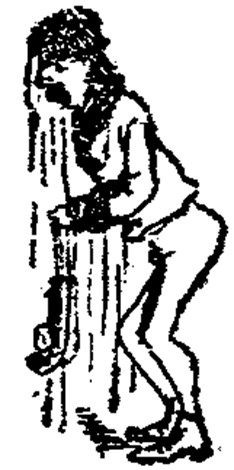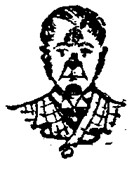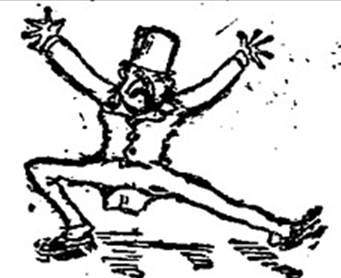This article has been transcribed from a copy of the Cardiff Times in the online collection of scanned Welsh newspapers 1804-1919 in the National Library of Wales, with grateful recognition of the free access accorded to all readers. Paragraph breaks have been introduced for easier reading.
This is the second of Samuel’s Sentiments on this subject, the first appearing on 22nd January 1887. There are overlaps in material and phrasing, with a few phrases and sentences copied or remembered. He sustains an ironic narrative style throughout, with some high-sounding, pseudo-historical phrasing. See also 4th December 1886 and 22nd January 1887. —David Skilton

There must be something catching about skating, sir, like the measles and the mumps. There is, I might say, something particularly catching I about the sport when one catches the blade of one's skates in a crack – one catches it hot enough then. But what I mean by skating being ‘catching’ is this, let any given boy walk along the streets, brandishing a new pair of skates (boys always do this; it is said to look ‘nap’ or clever), and I'll undertake to say that dozens of other lads will instantly rush off to their parents with earnest petitions for new skates; not a few will play truant and spend their ‘school brass’ by buying pieces of iron to be hammered into their boot-soles in lieu of skates; and a few more will, in default of going skating in a legitimate way and endangering their own lives, make long slides on the pavements for the special behoof of the passers by – and the doctors. Seeing another boy with a new pair of skates, sir, used when your Samuel was a happy and guileless youth, to excite in my bosom a burning desire to possess a pair of real ‘skeleton’ skates (the name ‘skeleton,’ by the way, is by no means inappropriate, considering how many skeletons they have assisted in making); but I used, finally, to effect a sort of compromise by purchasing a second-hand pair of the old-fashioned pattern – a pair with very long blades that curled about at the toe-end. These elaborate ends, in my own case, invariably got inter-locked, and the consequences were as dire as they were painful. The needful funds were raised by the sale of a pile of back numbers of ‘The Bold Boys of Britannia,’ a rusty pistol with a defective lock (disposed of to a boy who subsequently blew his thumb off); a vast collection of foreign postage stamps (consisting of some 80 specimens), and a cricket-bat with a cracked handle (sold to a boy with a cracked head) at a fancy price.

Regarding skating, sir, a hard and fast cynic might assert that it was one of those methods of disposing of a portion of the surplus population devised by a beneficent Providence, and he might further aver that the people who are usually the victims of skating accidents come under the category of those beings ‘who never will be missed.’ There are certain people who are said never to be able to pass a public-house, and there certainly are folk who can never pass a pond, with even a faint pretence of ice upon it, without venturing upon the latter. Such a cynic as that I have spoken of must derive intense satisfaction and amusement from watching his fellow mortals skating, or attempting to do so. How that cynic must chuckle as he watches the despair of the man who has come a long distance only to find that he is a strap short, or that he has lost one screw, and that he will, as a consequence, have to make a vain attempt to tie on his skates with bands. And fancy the agony of the man who, having submitted himself to the cold and merciless hands of a sweeper, has his heel bored nearly up to the ankle bone by the latter. Fancy how that cynic must ‘chortle’ with glee when he observes the wild paroxysms of the man who has sat down on the gimlet he has brought for the purpose of boring holes in his heels.

Sir, I flatter myself that I have a human and susceptible heart, and I tell you at once that the victim of his own gimlet is a man I sincerely pity. I have marked him often. Not only have I seen him sit down on the point of that gimlet, but I have seen him, with his benumbed fingers break the said gimlet short off In his heel in such a position that he couldn't possibly make an opening for the screw of his skates afterwards. Next to getting one's skates on, sir the hardest thing is to get them off. It is all very well for the ladies, whose dainty feet attract an[y?] amount of volunteers, but even for them it is not so very pleasant when some rough-handed fellow pulls one boot-heel off in his frantic efforts to adjust the screw properly. It is very painful for a man, though, especially when there's no chair to sit down upon, and the intending skater has to sit on a damp and snowy bank. Unless his clothes are very dark indeed in colour be looks as though a very extensive and elaborate patch had been let into a portion of his garments, and he feels decidedly uncomfortable when the wet patch has frozen a bit – he feels, in fact, as though his garment aforesaid had had a portion of a half-inch board let in instead of cloth. Really, sir, I take a savage delight myself (pardon this un-Samuel-like and un-Christian admission) in the discomfiture of one species of skater. I refer to the would-be ‘clever,’ ‘fancy,’ or figure skater – the man who likes to whirl about to the admiration, as he fancies, of the crowd. He likes to dress the part, so to speak, and usually turns up with a goodly quantity of cheap fur about him. If the pond be very crowded he attempts most persistently to monopolise a goodly portion of it for himself, so that he may cut an elaborate figure, resembling nothing in particular, upon the ice. To me, sir, it is intensely pleasing to see this young man taken out of curl, and, strange to say, he frequently is. Whilst he is careering madly backwards, fancying that all eyes in the vicinity are fixed upon him in rapt admiration, some unhappy hobbler, frantically trying to make headway, gets into the charmed circles in which he is moving; then comes a tremendous thud, a confused mass of arms and legs – and a crash.

Then are the cheerful ‘fishing hooks’ or grappling irons brought festively forth, and the twain are lugged ignominiously out by some portion of their nether garments. Oh, how truly miserable that befurred and altogether immaculate ‘fancy’ skater does look: with great difficulty are his skates got off; the by-standers are derisive; his dripping fur makes him look like a Newfoundland dog after a ducking; he departs homewards with the water singing a dismal chant in his boots to the castanet accompaniment afforded by his chattering jaws. A whole history, sir, might be written on the varieties of tumbles which fall to the lot of the average skater. Talk about the ‘Rise and Fall of the Roman Empire;’ it wouldn't be in it with a history of the ‘Rise and Falls of a Skater.’
Perhaps one of the very sweetest things in falls is the ‘Long Scrape,’ or ‘Face-parer.’ This is usually brought about by the unhappy victim stumbling on a brush handle left about by a careless or malicious ‘sweeper.’ You are going at full-speed, we will say you stumble over an obstacle; you grasp at the intangible air; you shoot violently forward for about four yards, and try to skate on the bridge of your nose. The effect upon your visage, especially if the ice is rough, is truly beautiful. You find that the cuticle from your nose, chin, and forehead has wholly disappeared, and you are in a most pleasingly red, raw state for many days. Another pleasing fall produces the effect known as ‘starring the glum.’ You and another skater are going backwards, and both tending from opposite directions towards one spot. You meet back to back, and you both do what is known as the ‘unconscious sit down.’ To show how susceptible is the ice to the pressure you have put upon it, I may say that you will find on its surface a Iarge white spot with cracks diverging therefrom. So emphatically have you sat down that you are not likely to do so afterwards -- even upon the common household chair, for some time to come. This fall is all the more enjoyable if the person you have collided with wants to get up a fight, on the ground that you ‘must be a fool, or you'd know where you was a-goin' to.’

the collision between the enthusiastic skater who turns his head aside for a moment to inform a companion that he Is ‘keepin' the pot bilin',’ and the earnest and conscientious skater who keeps bit eyes persistently fixed on his feet or on the ice. To see the twain meet, and then suddenly divide, and then suddenly sit down facing each other (but with many yards of ice between them) is said by connoisseurs to be almost equal to watching a heavy goods train and a cheap excursion (much over-loaded) collide.

Both parties would, immediately after the accident, afford most pleasing studies to a phrenologist through the unusual number and nature of their respective bumps. Oh, sir, how that cynic I have been referring to must appreciate that nobly independent individual who will not allow any man to teach him to skate – the man who is determined to learn, and with his arms and legs makes the most heroic efforts to attain the art. This personage gets in everybody's way, and if he fails himself he has at least the satisfaction of throwing everybody else down. He falls on his knees, on his elbows, or the back of his neck; on his head – on every part of his anatomy He does ‘the splits’; he ties himself into knots almost; he acts generally like a delirious creature. For myself, sir, I am not a true skater – I am sure I am not, because I am not prepared to go, on the slightest possible symptom of a frost, upon ice that I am very sure will not bear. That shows I am not a skater. What real, bona-fide, unadulterated skaters like is thin ice, with a nice deep pool (a disused quarry, a hundred feet in depth, preferred) underneath it. There is glory in a place like that. If you don’t believe me, go and ask the coroner or any of his mirthful jurors.
Last modified 27 January 2022